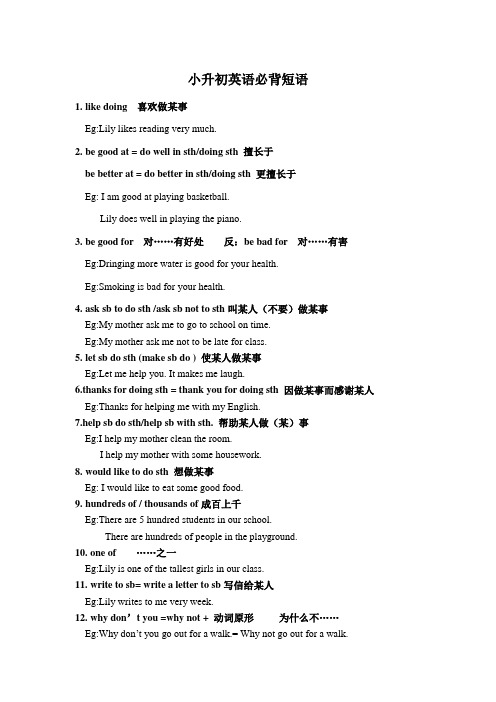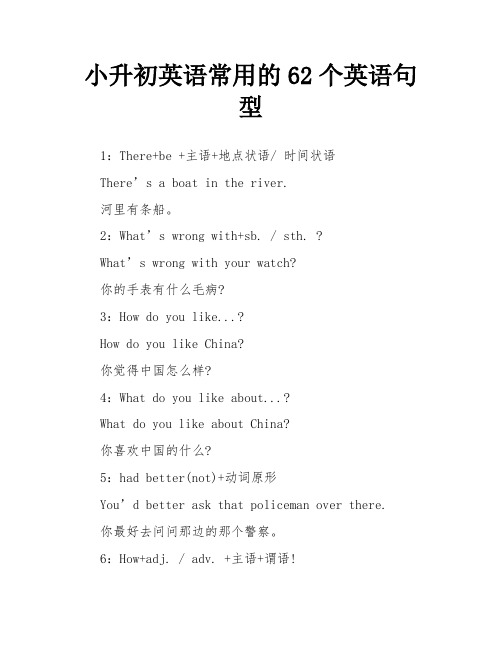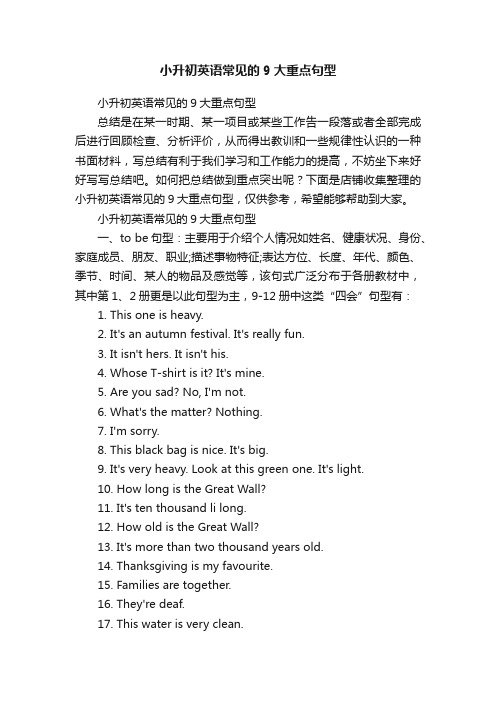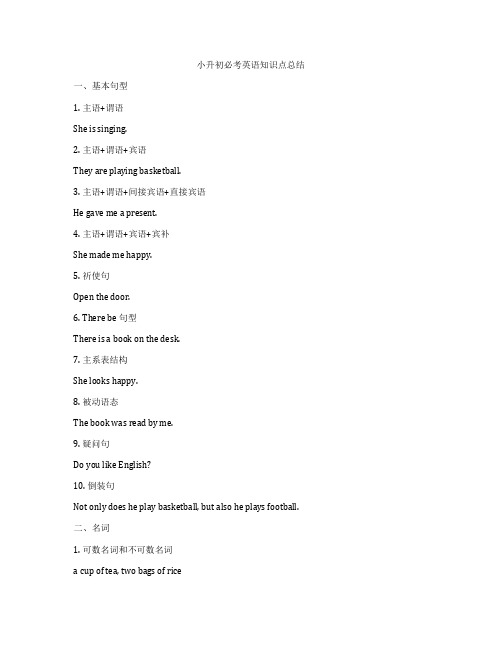小升初英语最常用的短语和句型
小升初英语必背短语(知识清单)-人教PEP版英语六年级下册

小升初英语必背短语1.like doing 喜欢做某事Eg:Lily likes reading very much.2.be good at = do well in sth/doing sth 擅长于be better at = do better in sth/doing sth 更擅长于Eg: I am good at playing basketball.Lily does well in playing the piano.3.be good for 对……有好处反:be bad for 对……有害Eg:Dringing more water is good for your health.Eg:Smoking is bad for your health.4.ask sb to do sth /ask sb not to sth叫某人(不要)做某事Eg:My mother ask me to go to school on time.Eg:My mother ask me not to be late for class.5.let sb do sth (make sb do ) 使某人做某事Eg:Let me help you. It makes me laugh.6.thanks for doing sth = thank you for doing sth 因做某事而感谢某人Eg:Thanks for helping me with my English.7.help sb do sth/help sb with sth. 帮助某人做(某)事Eg:I help my mother clean the room.I help my mother with some housework.8.would like to do sth 想做某事Eg: I would like to eat some good food.9.hundreds of / thousands of成百上千Eg:There are 5 hundred students in our school.There are hundreds of people in the playground.10.one of ……之一Eg:Lily is one of the tallest girls in our class.11.write to sb= write a letter to sb写信给某人Eg:Lily writes to me very week.12.why don’t you =why not + 动词原形为什么不……Eg:Why don’t you go out for a walk.= Why not go out for a walk.13.something important 一些重要的事情不定代词+形容词14.it’s time to do sth= it’s time for sth.是时候做某事了Eg:It’s time to have lunch.= It’s time for lunch.15.be like问性格,look like 问外貌be like 范围更大一些,有时候既问性格也问外貌Eg:What's your sister like? 你姐姐怎么样?/你姐姐是怎样一个人?She is kind. 她很善良。
小升初英语常用的62个英语句型

小升初英语常用的62个英语句型1:There+be +主语+地点状语/ 时间状语There’s a boat in the river.河里有条船。
2:What’s wrong with+sb. / sth. ?What’s wrong with your watch?你的手表有什么毛病?3:How do you like...?How do you like China?你觉得中国怎么样?4:What do you like about...?What do you like about China?你喜欢中国的什么?5:had better(not)+动词原形You’d better ask that policeman over there.你最好去问问那边的那个警察。
6:How+adj. / adv. +主语+谓语!What a/ an+adj. +n. +主语+谓语!How cold it is today !今天多冷啊!What a fine picture it is!多美的一幅图画呀!7:Thank+sb. +for(doing)sth.Thank you for ing to see me.感谢你来看我。
8:So+be/ 情态动词/ 助动词+主语He is a student. So am I.他是一个学生,我也是。
9:... not ... until ...He didn’t have supper until his parents came back.直到他的父母回来他才吃饭。
10:比较级+and+比较级The baby cried harder and harder.那孩子哭得越来越厉害。
11:the +比较级,the +比较级The more one has,the more one wants.越有越贪。
12:... as +adj./ adv.+as ...…not as(so) +adj. / adv. +as ...Do you think that art is as important as music?你认为艺术和音乐一样重要吗?Last Sunday the weather was not so wet as it is today.上个星期天的天气不如今天的天气潮湿。
小升初英语常见的9大重点句型

小升初英语常见的9大重点句型小升初英语常见的9大重点句型总结是在某一时期、某一项目或某些工作告一段落或者全部完成后进行回顾检查、分析评价,从而得出教训和一些规律性认识的一种书面材料,写总结有利于我们学习和工作能力的提高,不妨坐下来好好写写总结吧。
如何把总结做到重点突出呢?下面是店铺收集整理的小升初英语常见的9大重点句型,仅供参考,希望能够帮助到大家。
小升初英语常见的9大重点句型一、to be句型:主要用于介绍个人情况如姓名、健康状况、身份、家庭成员、朋友、职业;描述事物特征;表达方位、长度、年代、颜色、季节、时间、某人的物品及感觉等,该句式广泛分布于各册教材中,其中第1、2册更是以此句型为主,9-12册中这类“四会”句型有:1. This one is heavy.2. It's an autumn festival. It's really fun.3. It isn't hers. It isn't his.4. Whose T-shirt is it? It's mine.5. Are you sad? No, I'm not.6. What's the matter? Nothing.7. I'm sorry.8. This black bag is nice. It's big.9. It's very heavy. Look at this green one. It's light.10. How long is the Great Wall?11. It's ten thousand li long.12. How old is the Great Wall?13. It's more than two thousand years old.14. Thanksgiving is my favourite.15. Families are together.16. They're deaf.17. This water is very clean.18. It's fun to drink this way.19. How much is it? It's thirteen dollars and twenty-five cents.20. What's the matter?21. I'm really excited.二、there be句型:包括现在与过去两种,即:there is/are, there was/were。
小学英语小升初必备短语句型汇总(共22组)

小学英语必备短语句型一、+doing1. be busy doing sth.忙于做某事Mike is busy studying.麦克忙于学习。
2. be interested (in) doing sth. 对做某事感兴趣I'm interested (in) playing guitar.我对弹吉他感兴趣。
3. be worth doing sth. 值得做某事It's an idea that may be worth revisiting at a later date. 这个观点值得以后进一步探讨。
4. enjoy doing sth.喜欢做某事I enjoy working with you very much.我很喜欢和你一起工作5. succeed (in) doing sth.成功做某事He succeeded in finishing this task .他成功的完成了这项任务。
6. finish doing sth. 做完某事Could you help me after I finish reading?我读完书你能帮我吗?7. have fun doing sth. 做某事有趣I have fun working in my studio.我在工作室的工作很有意思。
8.have problem doing sth.做某事有困难They had problem making the new model.他们在做新模具的时候遇到了困难。
9. hear sb. doing sth. 听见某人正在做某事Listen! I hear someone crying.听!我听见有人在哭。
10. keep doing sth.坚持做某事I keep practicing spoken English every day.我坚持每天练习英语口语。
11. spend… (in) doing sth.花费……做某事We spent three years (in) following this herd.我们花了三年时间跟踪这个兽群。
小升初必考英语知识点总结

小升初必考英语知识点总结一、基本句型1. 主语+谓语She is singing.2. 主语+谓语+宾语They are playing basketball.3. 主语+谓语+间接宾语+直接宾语He gave me a present.4. 主语+谓语+宾语+宾补She made me happy.5. 祈使句Open the door.6. There be 句型There is a book on the desk.7. 主系表结构She looks happy.8. 被动语态The book was read by me.9. 疑问句Do you like English?10. 倒装句Not only does he play basketball, but also he plays football.二、名词1. 可数名词和不可数名词a cup of tea, two bags of rice2. 名词的所有格my father's car3. 名词的单复数a book, two books4. 特殊名词的复数形式child-children, woman-women5. 特殊名词的不可数名词形式news, information6. 特殊名词的复合名词形式forget-me-not, passer-by三、冠词1. 定冠词和不定冠词a book, the book2. 不加冠词的情况He is a student.3. 特殊用法once upon a time四、代词1. 人称代词I, you, he, she, it, we, they2. 物主代词my, your, his, her, its, our, their3. 反身代词myself, yourself, himself, herself, itself, ourselves, themselves 4. 特殊用法one another, each other五、动词1. 一般现在时He plays basketball every day.2. 一般过去时I played computer games yesterday.3. 一般将来时I will go to the park tomorrow.4. 现在进行时She is reading a book now.5. 过去进行时He was playing basketball at this time yesterday.6. 情态动词can, may, must, should, need7. 动词的不定式to do, to be8. 动词的-ing形式reading, playing9. 动词的完成时I have read that book.10. 动词的被动语态The book was read by me.11. 及物动词和不及物动词I like singing.六、形容词和副词1. 形容词的比较级和最高级big-bigger-biggest2. 副词的用法She sings well.3. 物主形容词my, your, his, her, its, our, their4. 特殊形容词和副词good-better-best, well-better-best七、介词1. in, on, at的用法in the classroom, on the desk, at home2. 特殊介词的用法under, over, between, among3. 介词短语in front of, next to, to the left of4. 介词词组on time, in time八、连词1. and, but, or的用法She likes playing basketball and football.2. because, so的用法He is tired because he works hard.3. 特殊连词的用法either...or, neither...nor, not only...but also...九、数词1. 基数词和序数词one, first2. 特殊数词的用法the first of October, one and a half 3. 特殊用法three times a week, two hours' time十、时间1. 日常时间的表达at seven o'clock, in the morning2. 一般现在时表示的未来情况I leave for Beijing tomorrow.3. 特殊时间状语的用法last Sunday, next Tuesday十一、情态动词1. can, may, must, shouldI can swim.2. 特殊情态动词的用法would like, need3. 特殊用法had better, have to十二、虚拟语气1. if引导的虚拟条件句If I were you, I would go now.2. wish引导的虚拟句I wish I were a bird.3. 特殊用法It's high time, If only十三、疑问句和感叹句1. 一般疑问句Do you like English?2. 特殊疑问句What's your name?3.感叹句What a nice day it is!四、定语和被定语1. 定语的位置和形式the red book, the book on the desk2. 被定语的位置和形式a city of the world, a boy with big eyes3. 特殊用法a cup of tea, the mother of all rivers 十五、主谓一致1. 就近原则Neither she nor I am good at singing.2. 特殊用法There be 句型十六、宾语从句1. 特殊宾语从句的引导词I know who the man is.2. 特殊宾语从句的时态I think he will come soon.十七、主语从句1. 特殊主语从句的引导词What you have said is true.2. 特殊主语从句的时态It's clear that they have won the game. 十八、定语从句1. 特殊定语从句的引导词The boy who is swimming is my friend.2. 特殊定语从句的时态I have lost the pen that you gave me.十九、状语从句1. 时间状语从句When the bell rang, we stopped working.2. 地点状语从句Where there is a will, there is a way.3. 原因状语从句Because he was ill, he didn't go to work.4. 条件状语从句If I were you, I would go now.5. 结果状语从句It's so late that we can't go out.六、语音1. 单词中元音的发音cake, team2. 单词中辅音的发音break, cream3. 单词重读音节的规律beautiful, comfortable4. 特殊音标的发音ai, ee, th七、词汇1. 同义词happy-glad, big-large2. 反义词happy-sad, big-small3. 同音词see-sea, for-four4. 词根act, behave5. 词缀happy-unhappy, Sunday-weekend 8、语法1. 句子成分的转换He doesn't like playing basketball. Playing basketball is not liked by him.2. 句子类型的转换She can swim. - Can she swim?十九、阅读1. 阅读理解阅读短文,回答问题。
小升初复习固定搭配及常用短语

小升初复习固定搭配及常用短语一、动词短语1. set off 出发,动身2. come up with 想出,提出3. catch up with 赶上,追上4. take advantage of 利用5. give up 放弃6. look forward to 期待7. make up 编造,组成8. figure out 弄清楚,理解9. bring up 养育,提起10. fill in 填写二、名词短语1. a piece of cake 小菜一碟2. a waste of time 浪费时间3. a lot of 许多4. a little 意味着5. as a matter of fact 事实上6. at once 立刻7. at the same time 同时8. at no time 决不9. by accident 偶然地10. by the way 顺便说一下三、形容词短语1. in a hurry 匆忙地2. in a bad mood 心情不好3. in the end 最后4. on purpose 故意地5. out of control 失去控制6. under the weather 身体不适7. with pleasure 非常乐意8. up to date 最新的9. off and on 断断续续地10. by no means 绝不四、介词短语1. in front of 在...前面2. at the end of 在...末尾3. on the other hand 另一方面4. by means of 通过...方法5. in the middle of 在...中间6. with the help of 在...的帮助下7. at the top of 在...顶部8. in the same way 以同样的方式9. for the sake of 为了...的缘故10. according to 根据五、副词短语1. all of a sudden 突然2. by the way 顺便说一下3. just in case 以防万一4. little by little 逐渐地5. on purpose 故意地6. as a result 结果7. at all 一点也不8. at once 立刻9. in general 一般来说10. on the contrary 相反地六、连词短语1. as soon as 一...就...2. as long as 只要3. so that 以便4. in case 假如5. even if 即使6. as if 好像7. rather than 而不是8. in order to 为了9. if only 要是...就好了10. whether or not 是否。
小升初英语短语固定搭配
小升初英语短语固定搭配以下是一些小升初英语中常见的短语固定搭配:1.allow sb to do sth:允许某人做某事•Example: My parents allow me to watch TV for an hour every day.2.ask sb (not) to do sth:叫某人(不要)做某事•Example: The teacher asked us to finish the homework before class.3.get rid of:摆脱•Example: I need to get rid of these old toys. They are taking up too much space.4.catch up on:赶上,补习•Example: I need to catch up on my reading. I've been falling behind in class.5.go to the park:去公园•Example: On weekends, we often go to the park to play.6.be quiet:保持安静•Example: Please be quiet in the library.7.do not touch:不要摸•Example: Do not touch the painting. It's very fragile.8.no eating and drinking:禁止吃喝•Example: There's a sign that says "No eating and drinking" in the museum.9.keep off the grass:不要践踏草坪•Example: Please keep off the grass. It's for everyone to enjoy.10.with pleasure:非常愿意•Example: Would you like to help me with this project? - With pleasure!这些短语固定搭配在小升初的英语学习中非常常见,掌握它们可以帮助学生更准确地理解和使用英语。
小升初英语常考固定搭配汇总
小升初英语常考固定搭配汇总1. Look forward to 期待例句:I'm looking forward to the summer vacation.2. Take part in 参加例句:I want to take part in the school sports meeting. 3. Get along with 与……相处例句:She gets along well with her classmates.4. Pay attention to 注意例句:Please pay attention to what the teacher is saying.5. Think about 考虑6. Give up 放弃例句:Don't give up easily. Keep trying!7. Look up 查阅例句:You can look up the word in the dictionary.8. Be interested in 对……感兴趣例句:They are interested in learning English.9. Take care of 照顾例句:I need to take care of my little brother.10. Make up 编造,弥补例句:She always makes up interesting stories.11. Speak loudly 大声地说话例句:Please speak loudly so everyone can hear you.12. Ask for 请求,要求例句:Can I ask for your help?13. Look after 照顾例句:My sister looks after our pet dog.14. Think of 想起,考虑例句:Can you think of a solution to this problem?15. Take off 脱下例句:He took off his jacket when he entered the room.16. Get up 起床例句:I usually get up at 7 o'clock in the morning.17. Put on 穿上例句:Don't forget to put on your coat before you go outside.18. Carry on 继续例句:We will carry on with the meeting tomorrow.19. Go on 发生,继续例句:What's going on here? Why is there so much noise?20. Turn on 打开例句:Please turn on the lights in the classroom.21. Turn off 关闭例句:Remember to turn off the TV when you finish watching it.22. Listen to 听例句:Please listen to what the teacher is saying.23. Write down 写下例句:Don't forget to write down the answers.24. Look at 看例句:Look at the beautiful flowers in the garden.25. Walk to 步行去例句:I usually walk to school every morning.26. Help with 帮助例句:Can you help me with my homework?27. Get on 上车例句:We need to get on the bus now.28. Get off 下车例句:Please get off the train at the next station.29. Wait for等待例句:I will wait for you outside the library.30. Study hard 努力学习例句:If you want to get good grades, you need to study hard.以上是小升初英语常考固定搭配的汇总,掌握这些固定搭配可以帮助你更好地理解和运用英语。
小升初英语常见短语和句型归纳
小升初英语常见短语和句型归纳一、常见动词短语(50个)1.get dressed 穿好衣服2.go shopping 去购物3.get up 起床4.go to bed 上床睡觉5.do homework 做作业6.have breakfast 吃早餐7.take a shower 洗淋浴8.go to school 去上学e back 回来10.listen to music 听音乐11.play basketball 打篮球12.watch TV 看电视13.do housework 做家务14.go for a walk 去散步15.have lunch 吃午餐16.make a decision 做决定17.take care of 照顾18.catch a cold 感冒19.look after 照顾20.ask for help 请求帮助21.call back 回电话22.check in 登记入住23.check out 退房24.clean up 打扫干净e in 进来e on 快点;加油e out 出版;出现e up with 想出29.cut down 砍倒;减少30.cut off 切断31.fall asleep 入睡32.find out 找出;发现33.give up 放弃34.go ahead 继续;前进35.go on 继续36.hang out 闲逛37.hold on 等一等;坚持38.hurry up 赶快39.look for 寻找40.look forward to 期待41.pick up 捡起;接人42.put on 穿上43.put off 推迟44.set up 建立;安排45.sit down 坐下46.stand up 站起来47.take off 起飞;脱掉48.try on 试穿49.turn on 打开(电器)50.wake up 醒来二、常见形容词短语(50个)1.be good at 擅长2.be interested in 对……感兴趣3.be proud of 为……感到自豪4.be afraid of 害怕……5.be late for 迟到6.be ready for 为……做好准备7.be worried about 担心……8.be famous for 因……而出名9.be full of 充满10.be angry with 生某人的气11.be fond of 喜欢12.be tired of 对……厌倦13.be sure of 确信14.be familiar with 熟悉15.be close to 接近16.be satisfied with 对……满意17.be good for 对……有好处18.be bad for 对……有害19.be different from 与……不同20.be similar to 与……相似21.be friendly to 对……友好22.be angry about 对……生气23.be afraid of 害怕24.be responsible for 对……负责25.be aware of 意识到26.be keen on 热衷于27.be jealous of 嫉妒28.be capable of 有能力做……29.be serious about 对……认真30.be curious about 对……好奇31.be hopeful of 对……抱有希望32.be grateful for 对……感激33.be ashamed of 对……感到羞愧34.be concerned about 关心35.be impressed with/by 对……印象深刻36.be bored with 对……感到无聊37.be excited about 对……感到兴奋38.be addicted to 对……上瘾39.be opposed to 反对40.be dependent on 依赖41.be known for 因……而闻名42.be fond of 喜爱43.be involved in 参与44.be accustomed to 习惯于45.be capable of 有能力46.be familiar with 熟悉47.be open to 乐于接受48.be popular with 受……欢迎49.be associated with 与……有关系50.be sensitive to 对……敏感三、常见介词短语(50个)1.in front of 在……前面2.next to 紧挨着3.on the left of 在……的左边4.on the right of 在……的右边5.in the middle of 在……的中间6.on the way to 在去……的路上7.at the end of 在……的末尾8.in the back of 在……的后面9.in the corner of 在……的角落10.by the side of 在……旁边11.in charge of 负责12.in favor of 支持13.in case of 万一;如果发生……14.in addition to 除……之外15.in spite of 尽管16.in terms of 就……而言17.in need of 需要18.in place of 代替19.in time for 及时20.in the face of 面对21.in front of 在……前面22.in exchange for 作为交换23.in contrast to 与……相比24.in the event of 万一25.in search of 寻找26.in memory of 纪念27.in honor of 为了纪念……28.in line with 与……一致29.in relation to 关于30.in touch with 与……保持联系31.in light of 鉴于32.in control of 控制33.in favor of 支持34.in accordance with 根据35.in advance of 在……之前36.on behalf of 代表37.on the basis of 基于38.on account of 由于39.on the grounds of 以……为依据40.in connection with 与……有关41.in response to 回应42.in view of 鉴于43.in line with 符合44.in opposition to 反对45.in association with 与……联合46.in return for 作为……的回报47.in the course of 在……过程中48.in the vicinity of 在……附近49.in the form of 以……的形式50.in support of 支持四、常见句型结构(10个)1.I think… 我认为……I think it’s a good idea. 我认为这是个好主意。
小升初英语短语分类汇总大全(最全)
小升初英语短语分类汇总大全(最全)小升初英语短语分类汇总大全(最全)1. 时间短语- in the morning(在早晨)- in the afternoon(在下午)- at night(在晚上)- on Monday(在星期一)- during the weekend(在周末)2. 问候短语- How are you?(你好吗?)- Good morning!(早上好!)- Nice to meet you!(很高兴见到你!)- What's up?(有什么新鲜事?)3. 学校短语- go to school(去学校)- study hard(努力研究)- homework assignment(家庭作业)- school break(放学时间)4. 家庭短语- family members(家庭成员)- have dinner together(一起吃晚饭)- at home(在家)- family traditions(家庭传统)5. 食物短语- eat breakfast(吃早餐)- drink milk(喝牛奶)- a slice of pizza(一片比萨饼)- healthy snacks(健康零食)6. 动物短语- pet dog(宠物狗)- cute cat(可爱的猫)- zoo animals(动物园动物)- wild animals(野生动物)7. 假期短语- summer vacation(暑假)- go on a trip(去旅行)- visit relatives(探亲访友)- have fun(玩得开心)以上是一份小升初英语短语分类汇总大全,其中包含了常见的时间、问候、学校、家庭、食物、动物和假期等方面的短语。
希望对你有帮助!。
- 1、下载文档前请自行甄别文档内容的完整性,平台不提供额外的编辑、内容补充、找答案等附加服务。
- 2、"仅部分预览"的文档,不可在线预览部分如存在完整性等问题,可反馈申请退款(可完整预览的文档不适用该条件!)。
- 3、如文档侵犯您的权益,请联系客服反馈,我们会尽快为您处理(人工客服工作时间:9:00-18:30)。
一、动词+介词1.look at…看…, look like …看上去像……, look after …照料…2。
listen to…听……3。
welcome to…欢迎到……4。
say hello to …向……问5。
speak to…对……说话此类短语相当于及物动词,其后必须带宾语,但宾语无论是名词还是代词,都要放在介词之后。
二、动词+副词“动词+副词”所构成的短语义分为两类:A。
动词(vt.)+副词1.put on 穿上2.take off脱下3.write down记下此类短语可以带宾语,宾语若是名词,放在副词前后皆可;宾语若是人称代词,只能放在副词的前面.B.动词(vi)+副词.1。
come on赶快 2.get up起床 3。
go home回家e in进来 5。
sit down坐下 6。
stand up起立此类短语属于不及物动词,不可以带宾语。
三、其它类动词词组1。
close the door 2。
1ook the same 3。
go to work/class4.be ill5.have a look/seat 6。
have supper7.1ook young 8.go shopping 9。
watch TV/games10. play games[介词短语聚焦]1.in+语言/颜色/衣帽等,表示使用某种语言或穿着……。
2。
in + Row/ Team/ Class/ Grade等,表示“在……排/队/班级/年级”等.3.in the morning/ afternoon/ evening/ 表示“在上午/下午/傍晚"等一段时间。
4。
in the desk/ pencil-box/bedroom 等表示“在书桌/铅笔盒/卧室里”。
5。
in the tree表示“在树上 (非树本身所有)";on the tree表示“在树上(为树本身所有)"。
6.in the wall表示“在墙上(凹陷进去)”;on the wall表示“在墙上(指墙的表面)”。
7。
at work(在工作)/at school(上学)/at home(在家)应注意此类短语中无the。
8。
at + 时刻表示钟点.9.like this/that表示方式,意为“像……这/那样”。
10.of短语表示所属关系。
11。
behind/ beside/ near/ under+ 名词等,表示方位、处所。
12.from与to多表示方向,前者意为“从……",后者意为“到……”.另外,以下这些短语也必须掌握。
如:on duty, after breakfast, at night, at the door, in the middle, in the sky, on one’s bike等。
[重点句型大回放]1。
I think…意为“我认为……”,是对某人或某事的看法或态度的一种句型。
其否定式常用I don’t think…,2。
give sth. to sb。
/ give sb. sth。
意为“把……给……”,动词give之后可接双宾语,可用这两种句型;若指物的宾语是人称代词时,则只能用give it/ them to sb.3.take sb./ sth. to…意为“把……(送)带到……”,后常接地点,也可接人。
4。
One…, the other…/One is…and one is…意为“一个是……;另一个是……",必须是两者中.5。
Let sb。
do sth。
意为“让某人做某事",人后应用不带to的动词不定式,其否定式为Don’t let sb,do sth.,或Let sb. not do sth。
另外,Let’s 与Let us的含义不完全相同,前者包括听者在内,后者不包括听者在内,6.help sb. (to) do sth。
/help sb. with sth。
意为“帮助某人做某事”,前者用不定式作宾补,后者用介词短语作宾补,二者可以互换.7.What about…?/How about…?意为“……怎么样?"是用来询问或征求对方的观点、意见、看法等。
about为介词,其后须接名词、代词或V-ing等形式。
8。
It's time to do…/ It’s time for sth。
意为“该做……的时间了",其中to 后须接原形动词,for后可接名词或V-ing形式。
9。
like to do sth。
/like doing sth.意为“喜欢做某事”,前一种句型侧重具体的一次性的动作;后一种句型侧重习惯性的动作,10.ask sb.(not) to do sth. 意为“让某人(不要)做某事”,其中ask sb.后应接动词不定式,11.show sb。
sth。
/ show sth. to do。
意为“把某物给某人看”,该句型的用法同前面第2点。
12。
introduce sb. to sb。
意为“把某人介绍给另一人”;introduce to sb.则是“向某人作介绍"。
[重点短语快速复习]1。
kinds of 各种各样的2. either…or…或者……或者……,不是……就是……3。
neither…nor…既不……也不……4. Chinese tea without, anything in it 中国清茶5. take a seat 就坐6。
home cooking 家常做法7。
be famous for 因……而著名8。
on ones way to在……途中9。
be sick/ill in hospital生病住院10。
at the end of在……的尽头,在……的末尾11. wait for 等待12. in time 及时13。
make one’s way to…往……(艰难地)走去14. just then 正在那时15. first of all 首先,第一16。
go wrong 走错路17。
be/get lost 迷路18。
make a noise 吵闹,喧哗19。
get on 上车20。
get off 下车21. stand in line 站队22。
waiting room 候诊室,候车室23. at the head of……在……的前头24. laugh at 嘲笑25。
throw about 乱丢,抛散26. in fact 实际上27。
at midnight 在半夜28. have a good time=enjoy oneself玩得愉快29。
quarrel with sb. 和某人吵架30. take one's temperature 给某人体温31. have/get a pain in…某处疼痛32. have a headache 头痛33. as soon as…一……就……34. feel like doing sth. 想要干某事35。
stop…from doing sth. 阻止……干某事36. fall asleep 入睡37. again and again再三地,反复地38. wake up 醒来,叫醒39。
instead of 代替40. look over 检查41. take exercise运动42. had better(not) do sth. 最好(不要)干某事43. at the weekend 在周末44。
on time 按时45. out of从……向外46. all by oneself 独立,单独47. lots of=a lot of 许多48。
no longer/more=not…any longer/more 不再49. get back 回来,取回50. sooner or later迟早51. run away 逃跑52. eat up 吃光,吃完53. run after 追赶54。
take sth。
with sb。
某人随身带着某物55。
take(good) care of…=look after…(well) (好好)照顾,照料56。
think of 考虑到,想起57。
keep a diary 坚持写日记58。
leave one by oneself 把某人单独留下59。
harder and harder 越来越厉害60。
turn on打开(电灯、收音机、煤气等)61. turn off 关[重温重点句型]1.So + be/助动词/情牵动词/主语.前面陈述的肯定情况也适于另一人(物)时,常用到这种倒装结构,表示“另一人(物)也如此。
”前面陈述的否定情况也适于另一人(物)时,常用“Neither/ Nor + be/助动词/情态动词+主语。
”这种倒装结构。
注意:“So+主语+be/助动词/情态动词。
”这一句型常用于表示赞同,进一步肯定对方的看法,表示“的确如此.”“是呀。
"2。
Turn right/left at the first/second/…crossing.这一指路的句型意为“在第一/二/……个十字路口向右/左拐。
”相当于Take the first /second/…turning on theright/left。
3。
It takes sb。
some time to do sth。
此句型表示“干某事花了某人一段时间。
”其中的it是形式主语,后面的动词不定式(短语)才是真正的主语。
4.…think/find + it + adj。
+ to do sth。
此句型中的it是形式宾语,不可用其它代词替代,形容词作宾语的补足语,后面的动词不定式(短语)才是真正的宾语。
5。
What’s wrong with…?此句型相当于What’s the matter/ trouble with…?后跟某物作宾语时,意为“某物出什么毛病了?"后跟某人作宾语时,意为“某人怎么了?”6。
too…to…在so…that…复合句中,that后的句子是否定句时,常与简单句too…to…(太……而不能……)进行句型转换.在so…that…复合句中,that后的句子是肯定句时,常与简单句…enough to…进行句型转换.7。
Sorry to hear that.全句应为I’m sorry to hear that。
意为“听到此事我很难过(遗憾).”常用于对别人的不幸表示同情、遗憾之意。
[重点句型、词组大盘点]1. She used to be a Chinese teacher. 她过去是一位汉语老师.[用法] used to + 动词原形,表示过去经常性的动作或存在的状态,含有现在不再如此之意.[搭配] used to do的否定式可以是usedn’t to do或didn’t use to do.[比较] used to do sth。
